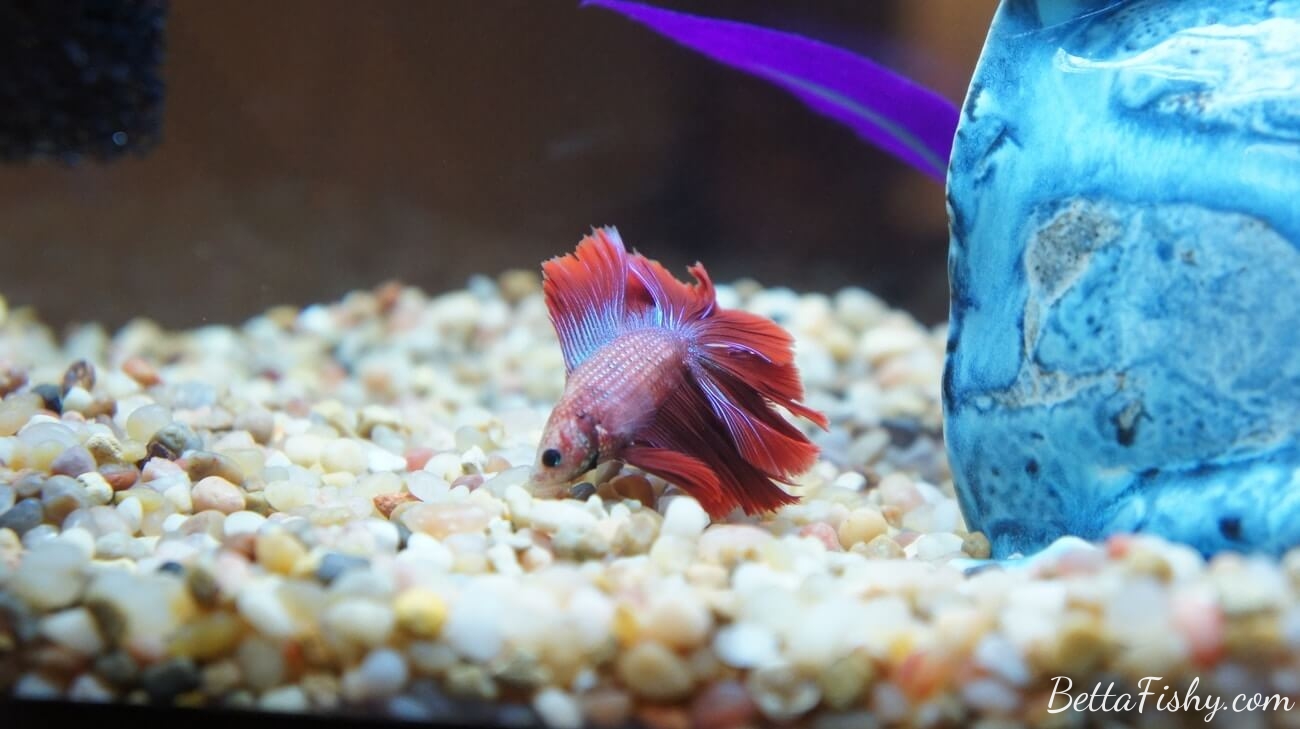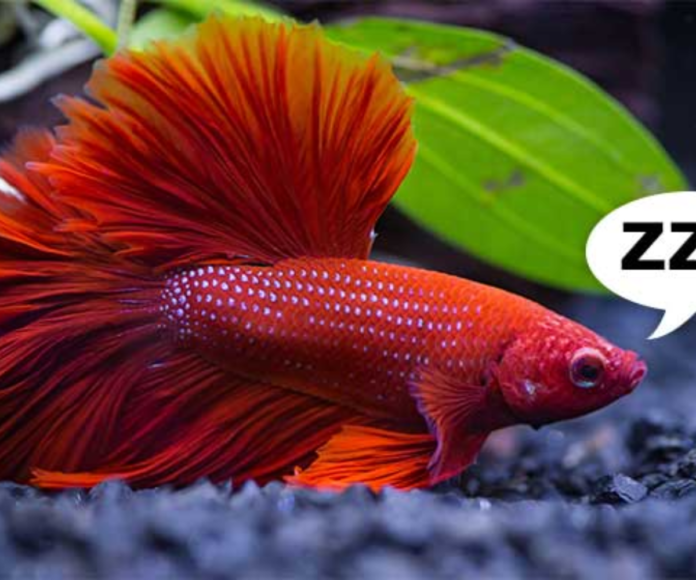Introduction
I’ll never forget the night I walked over to my betta fish’s tank and saw him sleeping in the strangest position. He was completely vertical with his head pointing down, lightly resting against the glass near the bottom of the tank. My first thought was that he had died and sank! I watched closely for a minute and saw the subtle movement of his gills as he breathed. What a relief to realize my fish was just sleeping soundly.
Seeing my betta sleeping in such an odd upright stance made me realize how little I knew about the sleeping habits of these fish. As pet owners, we need to understand betta sleep patterns to not only avoid panic when they sleep in silly positions, but also ensure we are providing them an environment conducive to healthy sleep. In this article, we will dive into everything you need to know about betta sleep – from how much they need to how to set up their tank for optimal overnight snoozing.
Do Bettas Actually Sleep?

Yes, betta fish do indeed sleep just like other fish and animals. Sleep is a vital biological process that is necessary for growth, development, and overall health in bettas. During sleep, a betta’s metabolism and physiological activities slow down as their body enters a restful state. Sleep allows their bodies and brains to recover and recharge for the next day.
According to research, bettas spend around two-thirds of a 24-hour cycle sleeping or resting. The exact amount can vary based on factors like age, environment, and time of year. Younger bettas tend to sleep more than adult bettas. And all bettas tend to sleep more in the winter when daylight hours are shorter and water temperature is cooler.
Quality sleep is important for bettas. Bettas that get insufficient sleep may show signs of lethargy, lack of appetite, increased aggression, poor coloring, fin clamping, and susceptibility to disease. Setting up proper sleeping conditions in your betta’s tank is an important part of caring for their health and wellbeing.
When and How Do Bettas Sleep?
Bettas tend to be most active during the day and sleep at night, just like humans. However, bettas will also take short naps sporadically during the day. At night, you’ll notice your betta become less active and start looking for a place to sleep in the tank.
Bettas may choose to sleep in a few different spots in the tank. Many bettas like to sleep near the surface of the water, especially in areas with broad leaf plants or floating logs where they can rest. Some bettas prefer to sleep in the middle of the tank, wedged between plants or tank decorations. Bettas may also sleep at the bottom of the tank, resting on the substrate or gravel. Where they choose to sleep comes down to the individual betta’s personality and preferences.
When sleeping, bettas will remain almost completely still in one spot. Their fins will be motionless, except for a very occasional small fin flick. Their gills will continue to move as they breathe, but otherwise the only movement you may see is a minor repositioning. Bettas often close their eyes when sleeping. Some bettas float in place, while others wedge themselves into a stable position. Sleeping bettas are peaceful and relaxed.
Here are some examples of common betta sleeping behaviors:
- Resting motionless on a leaf near the top of the tank
- Hovering without moving in one spot in open water
- Wedged between live plants or tank decor
- Lying on the tank bottom substrate
- Tucked into a cave or betta hammock
How Do Betta Fish Sleep?
Betta fish exhibit some unique sleep behaviors and positions compared to other animals. Here are some of the ways you may observe your betta sleeping:
Bettas often find a comfortable spot to rest and become completely motionless while sleeping. This could be on a plant leaf, rock, or decoration near the surface or bottom of the tank. According to FishLab, bettas will sometimes sleep curled up like a cat, lying on their side with their head pointed down.
Your betta may sleep vertically in the water column with their nose pointing up and tail dangling down. Or they may sleep horizontally near the surface or bottom. Bettas have even been observed sleeping upside down completely vertically with their belly and fins pointing up!
While sleeping, a betta’s gill covers will move slowly and rhythmically as they breathe. Their fins will be relaxed and not moving. Bettas often close their eyes when sleeping as well.
Understanding these sleep positions and behaviors allows you to recognize when your betta is sleeping peacefully versus when they may be ill or stressed.
Experience distinguishing between sleeping and sick/dead Betta fish
It can sometimes be hard to tell if your betta is sleeping or if something is wrong. There are some key differences in appearance and behavior between a sleeping betta and one that is sick or dying:
A sleeping betta will stay still at the top, middle, or bottom of the tank, often resting on leaves or decor. Its eyes may be open or closed. When startled or woken up, a healthy sleeping betta will quickly swim away.
On the other hand, a lethargic or sick betta may stay still on the bottom for prolonged periods and be slow to respond to stimuli. Its coloring may look faded and its fins clamped. Sick bettas often lose their appetite and may have labored breathing or other visible signs of disease like fin rot.
A dying betta will be unresponsive and have very slow gill movement or be motionless. Its eyes may be partially open and glazed over if dead.
You should be concerned if your betta shows signs of lethargy, loss of appetite, clamped fins, or abnormal behaviors for longer than a day or two. Be prepared to treat or isolate a sick betta from healthy tankmates to prevent transmission of disease.
How Much Sleep Do Bettas Need?
In general, betta fish require between 12-14 hours of sleep per day to remain healthy and active. This is the amount of time they would naturally spend sleeping or resting in the wild. Most of a betta’s sleep occurs at night, but they may also take short naps and rests during the day.
Bettas tend to be most active in the morning and evening. At night when the lights are off, they will find a resting spot and sleep for an extended period. Some bettas may continue to slowly swim around or explore while others will be completely still when sleeping.
During the winter months or in colder tank temperatures, bettas often sleep more than their typical 12-14 hours. Their metabolism slows down when they are less active, so they conserve energy by spending more time sleeping or in a restful state. It’s completely normal for bettas to sleep over 14 hours in the winter.
Make sure your betta has plenty of broad leaf plants or other resting spots in its tank. This allows them to sleep comfortably overnight. Maintaining proper water temperature and tank conditions will also encourage healthy betta sleep patterns year-round.
Do Bettas Need Darkness?
Bettas prefer to have darkness when sleeping, as they are most active during the day. In the wild, bettas experience a natural day/night cycle with 12-14 hours of darkness per day. Replicating this in captivity can promote healthy sleep habits.
While complete darkness is ideal, it’s not necessarily required. If your betta’s tank is in a well-lit room, there are some steps you can take to help block out light at night:
- Cover the tank with a dark-colored towel or blanket at night.
- Use aquarium backgrounds and plants to create shaded areas in the tank.
- Position the tank away from bright lights or windows if possible.
- Reduce overall room lighting at night.
Making the tank environment darker at night signals to your betta that it’s time to sleep. Be sure to uncover the tank in the morning so natural daylight cues their awake cycle. With some adjustments, you can promote healthy betta sleep even without complete darkness.
Betta Sleep Habits in Winter
During the winter months, betta fish tend to sleep more than usual. The colder water temperature causes their metabolism to slow down, making them less active overall. Bettas in warmer tropical climates may not experience this seasonal change, but if you live in a region with cold winters, you will notice your betta sleeping more.
It’s normal for bettas to sleep up to 14 hours in a 24-hour period. But in winter, that number can increase to 16-18 hours of sleep per day. They will spend more time resting at the bottom or in plants/decorations.
You shouldn’t be alarmed by this increased inactive time, as it’s simply your betta’s way of conserving energy when it’s colder. However, make sure the water temperature doesn’t drop too low. Bettas prefer 78-80°F water. Use a tank heater to maintain a healthy temperature if needed.
While bettas don’t hibernate, their sleep cycles do change in winter. Understanding these seasonal variations allows you to meet your betta’s care needs all year round.
Setting Up the Tank for Healthy Sleep
A well-designed tank setup can help promote natural and healthy sleep patterns for your betta. Here are some tips:
Add plants and leaves to give your betta resting spots. Silk or live plants with broad leaves, like amazon swords or anubias, allow a betta to sleep on the leaves like hammocks. Floating betta logs also make great sleeping spots. Having plants and leaves helps bettas feel secure and relaxed when sleeping.
Use low light or cover the tank at night. Bettas prefer sleeping in darkness, so turn off tank lights completely or use a low wattage blue bulb at night. If the tank is in a well-lit room, partially cover it with a dark towel at night to block ambient light.
Maintain proper tank conditions. Keep water temperature between 75-80°F, pH between 6.5-7.5, and ammonia and nitrites at 0 ppm. Good water quality reduces stress and allows for better sleep. Perform partial water changes 1-2 times per week.
Conclusion
Betta fish are omnivores and need a varied diet incorporating both plant and animal matter. The most important staple food sources are:
- High-quality betta pellets
- Live or frozen bloodworms, brine shrimp, daphnia, and other meaty foods
- Blanched vegetables like spinach, zucchini, and green peas
Avoid cheap fillers like regular fish flakes. Bettas may also enjoy occasional treats like mysis shrimp and tubifex worms.
When feeding bettas, only give them what they can eat in 2-5 minutes, 1-2 times per day. This prevents waste buildup and obesity. Their stomach is the size of their eye!
By feeding a wholesome, varied diet in proper portions, you ensure your betta friend enjoys excellent health and nutrition.


